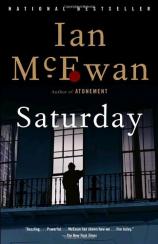Saturday
Review
Saturday
Ian McEwan is England's best living novelist. Pretty much everyone in England agrees. And although I have read only four of his dozen novels, I'll vote with the mob here --- ATONEMENT blew me away.
How does a book blow you away? Simple. It takes over your life. Slams you into your chair where you sit, hour after hour, devouring it. You wish you didn't have to eat, you despise the ringing phone, you wouldn't mind if you had a catheter. Need to go out? Read in the elevator, on the street. Essentially, life as you have known it stops --- and can't resume until, in some altered state, you reach The End.
ATONEMENT was like that for me. It had a terrific plot engine --- a 13-year-old girl makes a mistake and says something that hurts any number of people and ripples through their lives for decades. Injustice: That theme worked for Dickens, it works here, it will always work. And married to this freight train of a plot is great writing --- McEwan's account of Dunkirk is worth the price of the book --- and a resolution that makes you want to talk back to it.
McEwan is a master writer for lots of reasons. His exactitude. His ability to get inside a character --- all sorts of characters. His willingness to use the conventions of melodrama. And, happily, his understanding of the influence that movies have had on us. As he says, "I've always thought of novels as being importantly a visual medium. We are visual creatures. A good portion of our brain is dedicated to visual processing. It seems to me crucial in any important scene in a novel that the reader has a firm grip of what this looks like."
SATURDAY relies heavily on McEwan's strengths as a visual writer. Because the book is a huge trick --- although it is set, in London, on February 15, 2003, the day of worldwide protest against the upcoming Iraq war, we never see the march. Rather, this is a day in the life of Henry Perowne, a toweringly successful neurosurgeon. His day off, in fact, so we have a chance to see what a satisfied man looks like when he has time to be himself.
The day starts early. Henry awakes, hours before dawn, and looks out the window of his London townhouse. And there is fire low in the sky, a burning light lumbering over London. A missile? Or a plane with an engine burning?
Great metaphor, great opening scene. Comets and portents. Magic and destiny. This is not going to be a rewrite of that other day-in-the-life novel, Joyce's ULYSSES. As it happens, it's a fully packed day. Early morning sex with his wife. Shopping for a dinner that will be a family reunion. A minor car accident. A 17-page squash game. A bit of medicine.
Ah, medicine. McEwan watched a surgeon for months and months, and he not only takes us into the operating room in a way that makes "ER" look shallow, but he gets --- as a surgeon might --- deep under the surface of activity and into the glory of work. As McEwan says in an interview, he has a "fascination with work and its pleasures, the slight abandonment of self that complete immersion in work can bring, the focus. It needn't be work, actually --- it could be in a tennis game or cooking a meal --- but there's a certain kind of hard-to-describe, selfless elation that comes occasionally with writing, for example, certainly not all the time, but in moments, half hours, two-hour stretches, when you don't even know you exist. You're only doing the thing you're doing and you're not even aware of the clock or what you're going to do next or where you are in the story of your existence."
All the things McEwan does well --- no one does them better. You read on with interest, just because it is so damn pleasant to read him. But after a while, a question begins to form itself. A nagging, almost treasonous question: "Is this all there is?" Or, more bluntly: "When is this book going to start?"
At length you realize: The book is the book. It's not going to turn into another. But then it does --- and it's such a disappointing turn. The guy from the morning car accident is the Chekhovian gun that goes off in the final act. And it just feels...wrong. Like the end of a violent TV movie, just with PBS characters. Yes, the long action sequence ties up everything that's come before. Yes, it shows how disorder in the world can invade even the most orderly life. But you don't quite care.
Still, second-tier McEwan is better than first-tier writing from almost anyone else. If you have read ATONEMENT, you know you'll want to read anything McEwan writes --- starting with SATURDAY. But if you haven't read ATONEMENT, that is the McEwan to read.
Reviewed by Jesse Kornbluth on January 23, 2011
Saturday
- Publication Date: April 11, 2006
- Genres: Fiction
- Paperback: 304 pages
- Publisher: Anchor
- ISBN-10: 1400076196
- ISBN-13: 9781400076192










